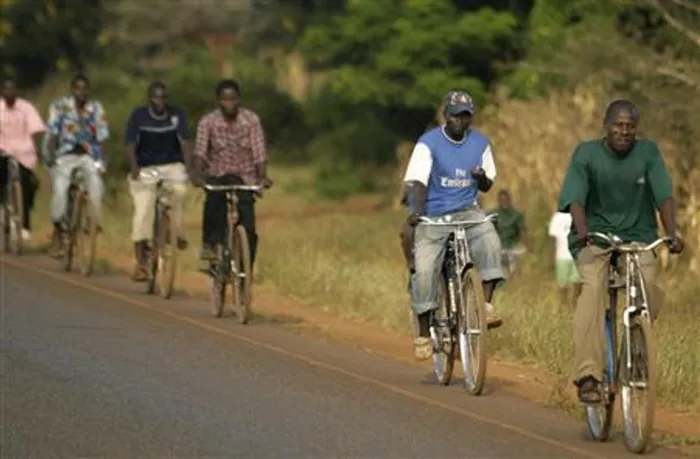Kabaza: The Malawi Uber

Picture: REUTERS/Siphiwe Sibeko - Bikers commonly known as "Kabadza", or "Dampers" ride along the Mchinji road-the highway linking Malawi to Zambia's eastern province, April 20, 2008.
By Catherine Banda
From time immemorial Africa has not had ownership power over its solutions because they were exploited by the international arena and were either imported or dictated to Africans however Africa has always been a nation that finds tailor-made solutions to its own challenges using available resources and giving confidence of ownership.
Malawi is not unique in finding or designing solutions to confront its daily challenges.
Due to the multifaceted problems that the country encounters, the high cost of living, the fuel crisis, the skyrocketing unemployment rate etc, Kabaza (Bicycle) has become the most effective and efficient means of transport in the country. The streets of Malawi are a craze of Kabaza drivers going up and down looking for customers/passengers.
The encouraging part of this enterprise is that most of the Kabaza owners are youths and young adults, which in a way has eased the burden of unemployment and also reduced crime. The Kabaza is easily accessible in any part of the country and therefore functions informally like an Uber as one can get a Kabaza from anywhere even as close as getting one by the doorstep. In terms of job creation, it is a value concept, it does not require a lot of resources or capital, and anyone can start the trade as long as they have a bicycle.
The Kabaza business is meeting a critical need in Malawi by offering the most flexible and affordable means of transport. Undoubtedly, bringing socio-economic groups out of poverty requires empowering groups to be self-reliant and therefore the business is an easy start-up since most homes on average own a bicycle. In addition, it is an effective way of enhancing economic and entrepreneurial growth. The business is also contributing to the mobility of society so that communities can survive economically, socially and physically.
The Kabaza story began in Karonga, in early 2005, a district located in the Northern Region of Malawi and the business traded under the name Cargo. This small trade became very lucrative in Karonga and it attracted a huge bulge of unemployed youths and young adults who ventured into the promising industry.
In no time a lot of youths in Karonga became Cargo business owners with an enviable income, sustaining their families and day-to-day costs of living. Subsequently, the business became overcrowded therefore other people in Karonga decided to migrate and start the same trade in Mzuzu.
Of course, in the same way, it started in Karonga, the business quickly gained momentum in Mzuzu operating under a different name, Sacramento was named after the newly introduced luxury coaches at that time. However the trade soon became swamped and for that reason, others decided to relocate to Lilongwe and initiate the same business there. Likewise in Lilongwe, the industry boomed but now trading as Kabaza which was later adopted as the well-known official national name for the trade. The Kabaza began to spread across the nation like wildfire as a result of urbanisation, unemployment and inadequate affordable intra-city public commercial transport.
The Kabaza business became an attractive venture and therefore captivated a few established businessmen, the likes of Mr Salumpha based in Mzuzu. He was the first to buy about 5 000 Kabaza, employing 5 000 youths at the time which attracted the attention of the Government in recognising and appreciate his efforts in job creation.
This trade in an underdeveloped country has various advantages namely their availability and affordability. They can also easily traverse through a narrow road or rough terrain, and navigate the most jammed roads with ease. They easily reach remote areas and meander through the hectic urban traffic thereby meeting the unmet transport needs of some urban residents. This type of transportation has quickly become popular not only in Malawi but also in other Countries its acceptance has increased steadily and has now become the primary mode of transportation in Malawi and Africa at large.
Furthermore, it has become a means of transportation regularly used by people of all ages, men and women alike, especially middle to lower-income earners. Unfortunately, not all Malawians embrace this means of transport as it is associated with the less privileged. One pointed out and said ‘the problem with Africans is we want to jump stages of economic and industrial growth, instead of us wishing to be developed in 1 day, it is good to start with what we have. I see uber eats in Kenya being delivered on small motorbikes and people get food on time without worrying about traffic jams. In New York deliveries are even done on skateboards” anonymous. Another said, “it is environmentally friendly as there are no carbon emissions.”
Indeed it is time we embrace African solutions to African problems towards a united, prosperous and peaceful Africa. We need to rise to the platform of defining power over situations pertaining to or affecting Africa.
To build Africa we want to see and live in, we need to unlearn certain imported principles that are not relevant to our existence and embrace our authenticity and being. As Africans, we need to navigate our resources and bank on Africa’s future thereby having a sense of self-reliance, responsibility, pride and ownership. We need to re-brand Africa and leave the image of a permanently troubled land behind or totally erase it.
In conclusion, Malawi is a beautiful country, that has a vibrant populous of youths who are inventors and solution minded, if only we can all embrace and support them then we can build a better Malawi and a great Africa.
Banda is a community activist, motivational speaker, writer and Poet based in Mzuzu Malawi. She is also a former radio presenter at 1873 FM in Johannesburg, South Africa.
This article is exclusive to The African. To republish, see terms and conditions.